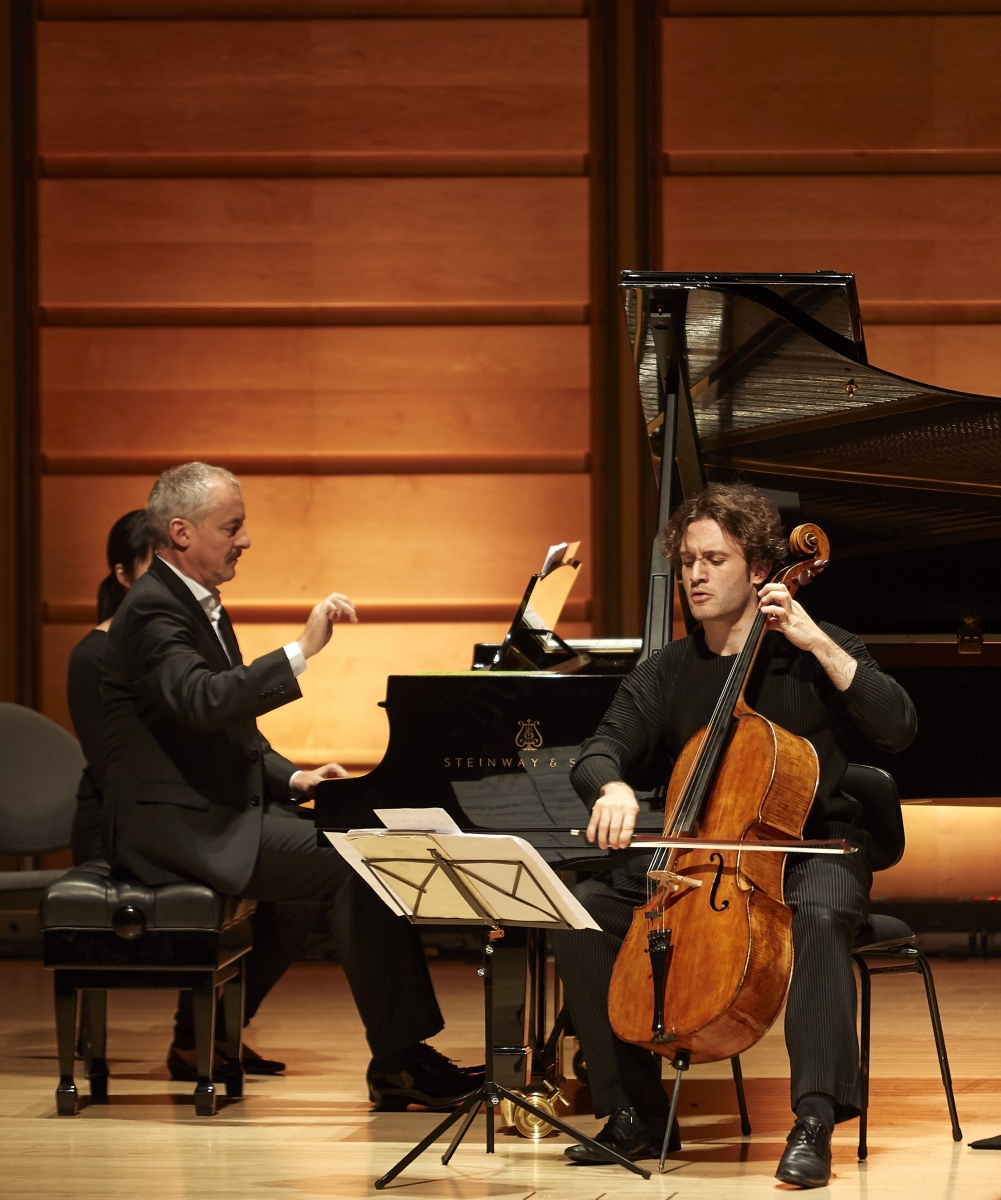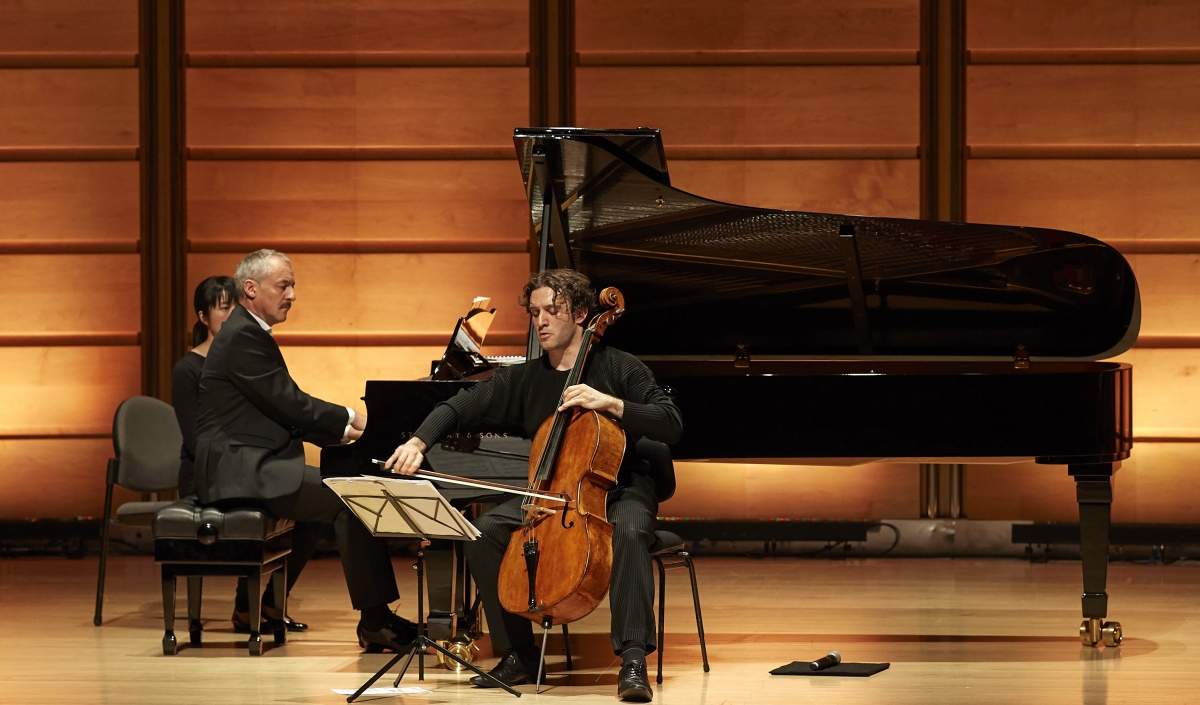German-French cellist Nicolas Altstaedt and Serbian pianist Aleksandar Madžar first performed together at the 2015 Musica Viva Festival in Sydeny, a Limelight review at the time describing the pairing as “a compelling partnership”. Musica Viva’s Artistic Director Carl Vine evidently agreed, having brought the two musicians back to Australia for their first recital tour as a duo.
And it was a programme to sink your teeth into. Altstaedt’s crisp, penetrating sound was arresting in the first movement of Debussy’s 1915 Cello Sonata – written during the composer’s final years as his health was failing him and World War I was raging – yet he brought a deftness of touch that lent his lines a graceful lyricism over the march of Madžar’s piano. The opening pizzicati of the Sérénade he gave a delightfully elastic walking-bass swagger. While this movement has been associated with the tragicomic Commedia dell’arte character Pierrot, in the hands of Altstaedt and Madžar it was all tragedy, crying slides from the cello dripping with pathos as the mood shifted between tender and sinister. The finale’s folk-like energy bristled with a gritty determination.
 Nicolas Altstaedt and Aleksandar Madžar. Photo © Keith Saunders
Nicolas Altstaedt and Aleksandar Madžar. Photo © Keith Saunders
A modicum of tranquillity crept into the programme in Boulanger’s Three Pieces for Cello and Piano, composed the year before the Debussy. Glittering piano shone beneath lonely cello in the first movement, while the second was a simple song of beauty and longing, Madžar’s right hand following Altstaedt in canon. Boulanger – who taught what seems like half the musical minds of the 20th century – reworked these movements from earlier organ music, but it was the third that was the real highlight: a fierce, barnstorming movement that saw Madžar driving the melody with Altstaedt strumming a brisk off-beat accompaniment.
After the jagged energy of the Boulanger, Samuel Barber’s Op. 6 Cello Sonata of 1932 saw the duo shift gears, Altstaedt’s cello – his sound intense with tightly spun vibrato – emerging from the piano’s tenebrous harmonies. While this movement had the duo tracing longer, dream-like phrases there was plenty of drama too – cut-offs so abrupt as to be almost abrasive and trembling, post-climax softs to give you goose bumps. The sound in the Adagio was lush – diverted in the middle section by a light-footed scherzo – returning with a passionate fullness, while the finale saw the two instruments grappling with each other.
 Nicolas Altstaedt and Aleksandar Madžar. Photo © Keith Saunders
Nicolas Altstaedt and Aleksandar Madžar. Photo © Keith Saunders
The world premiere of Jakub Jankowski’s Aspects of Return for Cello and Piano followed the interval, a vibrant, seething work opening with wildly sliding cello lines and thick piano textures. Each movement of Jankowski’s sonata pairs with a quotation. The first, Prologue, is by Jung: “…there is always the danger that the things we have neglected will return with force.” Cello and piano seemed to writhe together, trilling figures moving seamlessly from one instrument to the other, as if both were part of the same instrument, each part augmenting the other. Jankowski – a self-styled “native cello-speaker” – knows his instrument, using its full palette to paint rich, dramatic colours. Altstaedt whistled clear-toned pitches above the haunting harmonics of his cello and elicited rubber-band twangs of pizzicato glissandi over pointillistic piano figures. The sliding material from the opening did indeed return, but with a fractured intensity and energy to close the movement.
Nocturne is paired with a quote from Heraclitus of Ephesus: “Ever-newer waters flow on those who step into the same rivers.” The movement saw the players producing meditative drones, Altstaedt adding hummed vocal lines to the texture and Madžar running a cloth or card over the piano keys for a susurrus moth-fluttering effect. Ethereal harmonics opened the finale, glistening against the piano’s upper register, the movement based on the quote: “And the end of all our exploring will be to arrive where we started and know the place for the first time.” (TS Eliot could have been describing sonata form.) Titled Capriccio, the movement ventured widely from folky pizzicato work to a dancing intensity that tipped into frenzy. The harmonics of the opening return at the conclusion against a percussive patter of high register piano.
Shostakovich capped off the evening. (“This is what we’re here for,” growled a woman in the audience behind me.) The Russian composer’s Cello Sonata – written in 1934, before the denunciation of his Lady Macbeth of Mtensk – is one his more uplifting works. The gentle lyricism of the first movement – Altstaedt tracing winding lines over the undulating piano accompaniment – is Shostakovich at his most romantic. While this work predated the composer’s trouble with the authorities, his life wasn’t completely free of storm clouds, with his marriage to his wife Nina struggling as he became infatuated with a 20-year-old translator. The madly spinning dance of the second movement saw the piano’s crystalline melodies set against guttural cello while the duo gave the spare lines of the Largo plenty of breathing space. The finale was darkly cheeky – though stopping short of the bitter sarcasm of some of his later works – Altstaedt and Madžar leaning into the lurching jumping-off points and finishing off the concert with a flurry of quirky energy and fierce virtuosity.
Altstaedt and Madžar’s ensemble work throughout the concert was so secure as to be almost completely unnoticeable, the pair barely moving or making eye contact during their performance, yet breathing and playing together with a precise synchronicity. Overall this was a dark, heavy programme, with few moments of real lightness – in less sure hands it could easily have become turgid – but in the hands of musicians of such striking intensity it was captivating from start to finish.
Nicolas Altstaedt and Aleksandar Madžar tour nationally for Musica Viva Australia until September 30.











Comments
Log in to join the conversation.